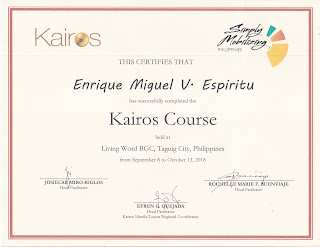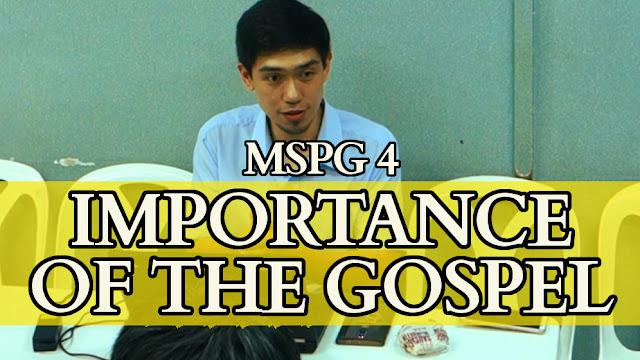Review: Kairos, 4th Edition
My first exposure to Kairos was in 2008/9 during IVCF's Missions Camp. I was unable to finish the course, but I kept the reader.
Ten years and one edition later, I retook the course with a very specific question in mind: Could I recommend it to Higher Rock's leaders for our church members?
ABOUT KAIROS
The Kairos Course was developed by Living Springs International as a tool to mobilize the body of Christ for world evangelization. It uses material from two main sources:
- World Mission, edited by Dr. Jonathan Lewis
- Perspectives on the World Christian Movement, edited by Dr. Ralph Winter and Steven Hawthorne
As I'm told, it started out as the Condensed World Missions Course, but was further abridged to make it more accessible to people.
Now, here is my personal assessment of the Kairos Course, based 1) on the course materials, and 2) my own experience in taking the course. I understand that a different group of facilitators may say and do things differently than what I experienced, but assuming they don't go against or replace the course material the ideas communicated to their class would remain essentially the same.
KAIROS' STRENGTHS
First of all, it is evangelical. As far as I could tell, doctrines like Christ's penal-substitutionary atonement, justification by faith alone, and the authority of Scripture are built into the course material, and the facilitators themselves are evangelicals.
Secondly, it is interdenominational. It is part of a movement that crosses lines of denomination and association, and one of the best parts of attending the course is interacting with fellow believers who have different doctrinal distinctives than your own and yet seem to manifest the work of the Spirit in their lives and ministries. This, to me, is the X-factor, the greatest appeal of the course. There's no telling how believers from one part of the body of Christ can be challenged and encouraged when they are exposed to brethren from other parts of the same body. I found myself repeatedly thanking God and telling people that I was receiving so much encouragement from the course!
It is also systematic and comprehensive. The makers of Kairos don't just want to change Christians' behavior toward missions. They believe that nothing less than a change of worldview is necessary to mobilize the church! And so the first half of the course is a powerful presentation of God's mission and how it relates to the Bible and all of redemptive history.
Fourth, it introduces very helpful insights from church history and missionary practice. The speakers were/are field workers. Most if not all of the facilitators had significant field experience, as well. That's not something you can easily substitute, because you either have access to such resource persons, or you don't. As for strategic insight, perhaps the most important one is the need to put strategic focus on the Least Reached Peoples of the world.
Last but not least, it is focused on God and His glory in the world. I love this! Take, for example, these statements:
The Bible is basically a story about God. How thrilling to discover that every element of scripture... converge as one grand story about one worthy Person.
We are used to hearing that the Bible is a love story. But we tend to see only one side of the love: how God loves people. If the main point of the Bible is that God is to be loved with heart, soul, mind and strength, perhaps it would be wise to read the entire story from God's point of view. God is not just loving people. He is transforming them to become people who can fully love Him.This is a needed correction of so much the therapeutic, man-centered approach to church that is prevalent in so much of evangelicalism today.
That being said, I have serious reservations about the course.
MY MAIN CONCERNS
 Kairos is very good at showing how missions is such a big and comprehensive theme in Scripture. Yet they often overstate their case. Take Genesis 12:2-3, for example. This is essentially a promise to bless all nations through Abraham's offspring, the Messiah (cf. Acts 3:25 and Gal 3:16), but the course treats it as a command to Abraham and his descendants to intentionally go around blessing the nations. This is unfortunate because the course material puts a lot of stock in this misinterpretation.
Kairos is very good at showing how missions is such a big and comprehensive theme in Scripture. Yet they often overstate their case. Take Genesis 12:2-3, for example. This is essentially a promise to bless all nations through Abraham's offspring, the Messiah (cf. Acts 3:25 and Gal 3:16), but the course treats it as a command to Abraham and his descendants to intentionally go around blessing the nations. This is unfortunate because the course material puts a lot of stock in this misinterpretation.This leads to my second concern, the apparent disregard for progressive revelation. The reader, the instructional videos, and the facilitators all repeatedly spoke of Old Testament texts as if they bore the full weight of New Testament revelation on missions. Let me give a few examples:
Claim: A three-fold strategy emerged from God's intervention at the Tower of Babel. Firstly, this was to reach humankind, not as one vast mass, but as multitudes of separate cultural groups (nations of peoples). Secondly, no longer would God deal directly with humankind, but would work through chosen human agents. And thirdly, God was choosing to reach humankind, not just in one location, but in scattered geographical regions.
Problem: This interpretation seems to have been pulled out of a hat. It isn't grounded in the biblical author's original intent.
Claim: The Great Commission is a reaffirmation of the Abrahamic Covenant.
Problem: Was that really all it was, a "reaffirmation"?
Claim: Israel had always, in the plan and purpose of God, been responsible for communicating the message of God's grace to the nations. Israel was meant to be a communicating, missionary nation.
Problem: Even though this is reaffirmed again and again throughout the course, the evidence used to support it is flimsy.On the practical side, I'm uncomfortable with the level of contextualization endorsed by the course. One facilitator insisted that people can remain Muslims while being followers of Jesus Christ. That just isn't possible!
Fourthly, out of an admirable desire to point out how essential missional thinking is to discipleship, important questions pertaining to the gospel are glossed over. Certain statements in the material and by the facilitators seemed to endorse a non-Lordship salvation. Similarly, the particulars of the gospel are never really laid out, rather a common understanding of the gospel is simply assumed.
My next point is one that I make with caution. Based on my interaction with the materials, the facilitators, and my classmates, Kairos seems to foster pride in being missional over against being a "typical" and "nominal" Christian. Take these statements, for example:
So when Jesus said, Go make disciples, was He telling Peter and the other disciples to go find some half-committed Christians and help them become disciples? Or was He talking about finding unsaved people and helping them repent and turn to Jesus? There were no half-committed Christians; the mandate was to reach the lost. (5-9)
People who live their life aimed at Christ's global purpose are sometimes called World Christians. World Christians pursue God's purpose as the focal point of their entire life. They aren't superior to other believers. They've simply decided [subtext: unlike other believers] to allow every decision of their lives to be directed by the magnetic pull of God's purpose.
A fifth issue I take with Kairos is the prevalence of eisegesis in every segment of the course. It's one thing to correct a handful of doctrinal errors, but it's simply impossible to correct every instance when the teacher or facilitator plays fast and loose with Scripture. The pastors of Higher Rock are responsible for training our members to rightly handle the word of truth, and Kairos could very easily undermine that.
Finally, I'm concerned that the church members might get turned off to the idea of being missional because of the poor handling of Scripture. Even as a pastor with a scholarly background, it took me two weeks to get over my initial disdain and indignance and begin to appreciate the blessings that were nevertheless there to be received. I don't think the typical member of my church has sufficient training or patience to do that. The most important thing I learned through Kairos is the very thing I don't want others to reject because of the doctrinal and hermeneutical problems of the course.
CONCLUSION
After considering the pros and cons of Kairos, I ultimately decided not to recommend it to the leaders for the members of my church. Yes, God did use it to minister to me, personally, but sadly it comes with too much baggage.
That being said, if a believer who is well-taught, discerning, and reasonably skilled in interpretation tells me he wants to take it, I would heartily encourage him to go ahead. Of course, I'd also tell him to be careful about the things I mentioned above.
That being said, if a believer who is well-taught, discerning, and reasonably skilled in interpretation tells me he wants to take it, I would heartily encourage him to go ahead. Of course, I'd also tell him to be careful about the things I mentioned above.


